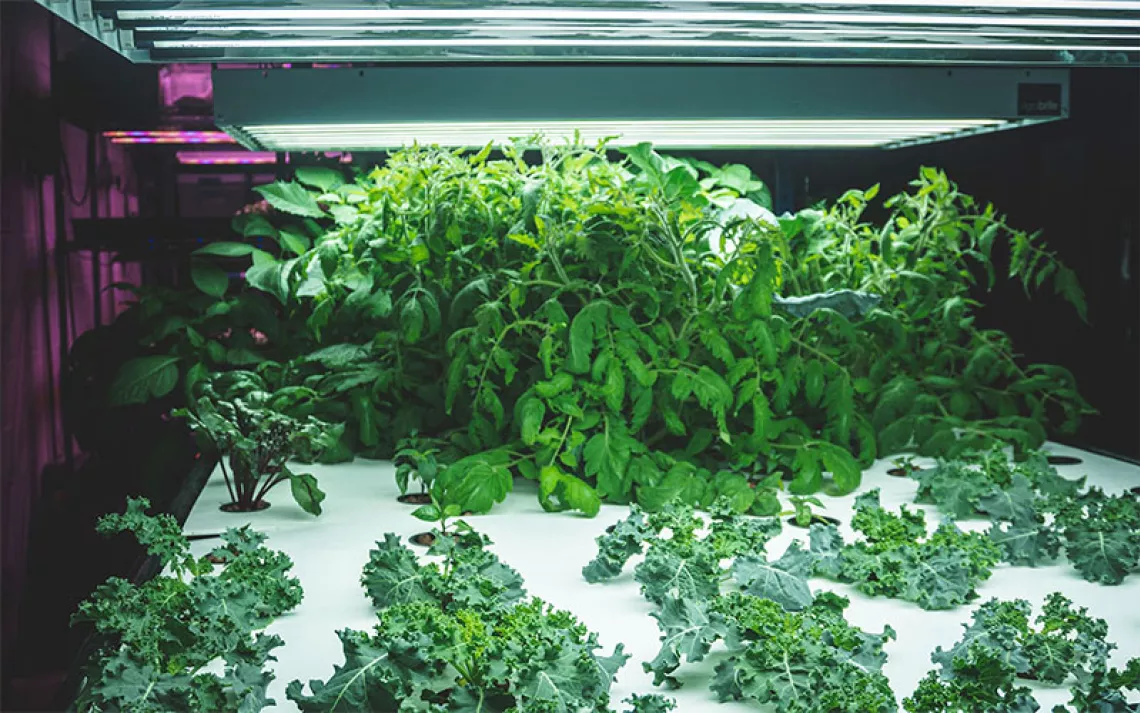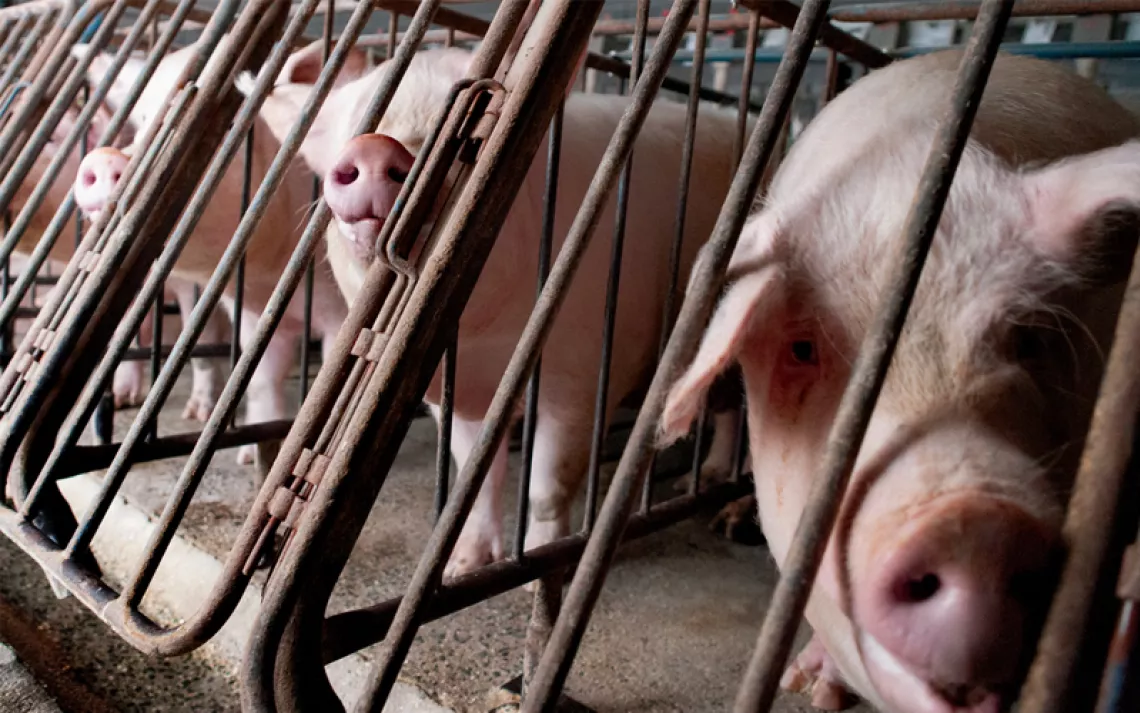In an Ironic Twist, GOP Farm Bill Proposal Attacks States’ Rights
The King Amendment would strip states’ ability to regulate food and farm policies
Update: On June 21, the House passed its farm bill, H.R. 2, which has been widely criticized by farm and food advocates, by a vote of 213-211, after weeks of uncertainty over whether leadership would be able to secure enough support. Meanwhile, the Senate Agriculture Committee has put forth a farm bill with bipartisan support that in many ways invests in sustainable agriculture. The Senate is planning to vote on its version as soon as next week, and passage is widely expected. How quickly Congress is able to deliver a bill for Trump to sign will depend in large part on how House and Senate negotiators reconcile differences over funding for nutrition assistance programs.
Update: On May 18, the House voted against the proposed 2018 farm bill 213 to 198. Democrats were united in their opposition to the legislation and 30 Republicans crossed the aisle to vote against the measure—in large part as a protest against the House leadership's failure to take up hard line immigration legislation. In response to the legislation's defeat, Athan Manuel, the director public lands protection at the Sierra Club, said in a statement: “This bill is massively, and rightly, unpopular as today’s vote demonstrated.It’s time for House Republicans to return to the drawing board and create a bipartisan solution that protects families and our environment."
Thought the House Agriculture Committee’s proposed 2018 farm bill couldn’t get any friendlier to Big Ag? Think again. House Republicans have approved new language that, if passed, could nullify thousands of state laws that promote public health, keep food and water safe, and protect animals.
Named for its Republican author, Iowa representative Steve King, the King Amendment (officially known as the “Protect Interstate Commerce Act”) would strip state and local governments of the ability to pass and enforce laws regulating the production or manufacture of agricultural products that cross state lines. “Agricultural products” is an extremely broad term that includes horticultural, viticultural, and dairy products; livestock and poultry; bees; fish; forest products; and pets. Under the King Amendment, no state would be able to pass food and agriculture laws that establish standards that are stricter than any other state’s or more stringent than federal rules.
That’s a problem. The King Amendment would make the most hazardous, environmentally destructive, and unethical agriculture practices into non-negotiable lowest common denominators—forcing all states to stoop to the weakest possible regulations. “It creates a race to the bottom,” says Kara Shannon, senior manager of the ASPCA’s Farm Animal Welfare Campaign. “If this act truly were to pass, it would without hyperbole be one of the worst things that’s happened to animal welfare and progress in recent history.”
The House began debating the Agriculture Committee’s proposed farm bill and its 20 amendments on May 16, and is likely to vote on the legislation by the end of the month.
For a real-life example of the King Amendment's impact, consider the egg industry. King’s home state of Iowa tolerates the production and sale of eggs from hens confined in cramped battery cages. California bans the sale of such eggs—whether produced in or out of state. Under King’s proposal, California would no longer be able to maintain its own egg standards, as they exceed the federal standard regarding the on-farm conditions of laying hens. King’s legislation would, in theory, allow battery-cage-using egg suppliers or distributors outside the Golden State to sue California for the right to sell their product within the state—thus opening up grocery-store shelves to factory-farmed products that don’t meet California’s current animal welfare standards.
“We can’t let every state decide what’s going on in all the other states or refuse to accept their products,” King has said. “We have inspectors from California that are now traveling around Iowa with their tape measures, measuring the cage sizes of our laying hens in Iowa.” While King seems to have introduced his amendment specifically to target California’s egg standards, his provision would effectively undermine an untold number of other regulations. These include North Carolina’s requirement that hog manure ponds and spray fields be located 1,500 feet from residences, Hawaii’s newly passed ban on the neurotoxic pesticide chlorpyrifos, Delaware’s restriction of BPAs from baby bottles, and California’s landmark policy stipulating that pet stores exclusively sell rescue and shelter dogs and cats.
“The federal USDA regulates the Animal Welfare Act, which provides bare-minimum standards for dogs and cats raised in commercial settings, and the King Amendment would keep states and municipalities from ensuring that animals for sale are being sourced from shelters and not commercial breeders,” says Andrew Binovi, senior manager of federal legislation for the ASPCA. He adds that states would no longer be able to ban the sale of dog and cat meat or the slaughter of horses.
Jordan Giaconia, an associate for federal policy at the Sierra Club, describes the King Amendment as special interest legislation. “Whereas the common messaging surrounding the farm bill is about empowering local and family farmers to continue to produce healthy, safe, sustainable food products, this provision would promote factory farms over small farms that practice good environmental and animal stewardship,” he says. “It gives industrial ag a major advantage—so long as they don’t violate a federal rule, they can produce whatever they want and send it across state lines.”
Aside from threatening important animal welfare and environmental regulations, the King Amendment could undermine states’ abilities to protect workers’ rights, consumer safety, and air and water quality. And it could erase long-standing regulations concerning food packaging, licensing, record-keeping, and transport. What’s more, a large number of consumer products include small amounts of agricultural products within them—think about the glue used the make running shoes. "It’s likely to have huge effects beyond the agricultural commodities it is intended to protect,” Giaconia says. “It’s quite the violation of states’ rights—which is interesting coming from someone who brands himself as a states’ rights advocate.”
This isn’t the first time Representative King has tried to tack this provision onto the federal farm bill. He introduced a similar proposal in 2014 (the farm bill needs to be renewed every five years), pitching his amendment as a way to promote “open and unrestricted commerce” and “free trade between the states.” Although the House Agriculture Committee adopted the original King Amendment, the measure ultimately failed after legislators, farmers, ranchers, environmental rights groups, and animal welfare organizations rallied in opposition.
While Democrats and many others again stand firmly opposed to the latest King Amendment, a few seem to be complacent about beating it. As Binovi notes, “Political implications have certainly changed since the last farm bill.” Binovi reports that the Congressional Animal Protection Caucus, led by Oregon Democrat Earl Blumenauer and Florida Republican Vern Buchanan, is leading the charge against the King Amendment. “They’re telling their sides of the aisle just how dangerous this provision is.”
If the King Amendment makes it all the way through both the House and the Senate, it would almost certainly face significant constitutional challenges in court. After all, the provision would fundamentally transform the balance of authority among the states, and between states and federal government, as well. “It’s betraying the legacy of previous farm bills,” says Giaconia. “The effects are so far-reaching, it’s difficult to overstate what a detrimental effect this would have.”
 The Magazine of The Sierra Club
The Magazine of The Sierra Club




